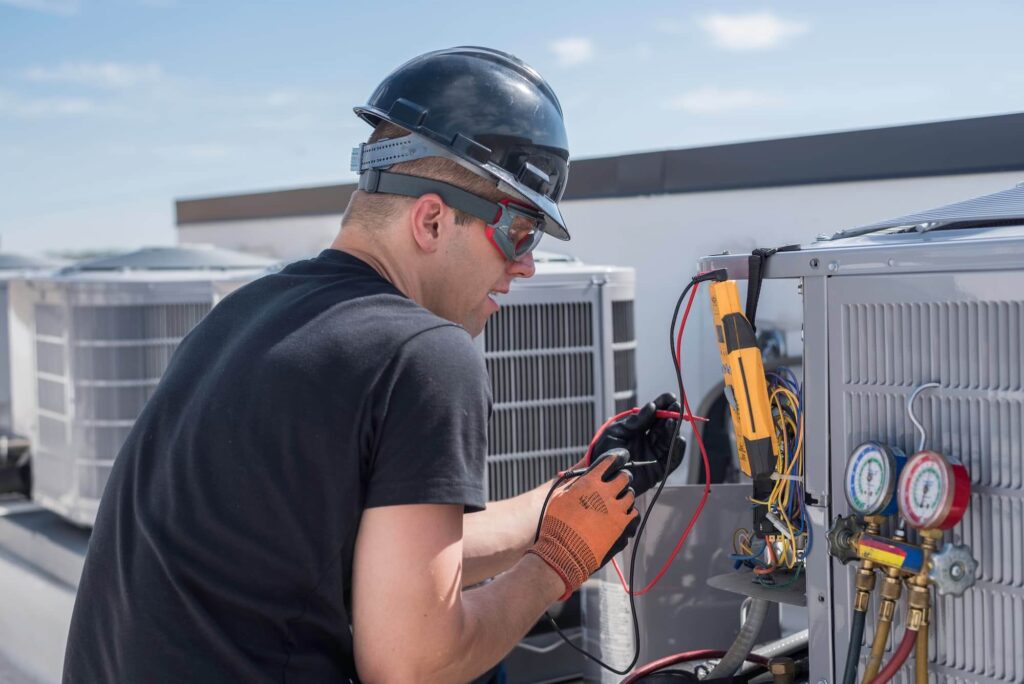When it comes to cooling your Toronto home, choosing between a heat pump and a central air conditioner system can be challenging. Both systems have their advantages and drawbacks, depending on your budget, energy efficiency needs, and year-round climate control preferences. In this guide, we’ll compare both systems to help you decide which is the best option for your home in Toronto.
How Do Heat Pumps and Central Air Conditioner Systems Work?
Before comparing the two, it’s important to understand how each system functions.
Heat Pump
A heat pump is a versatile, all-in-one heating and cooling system that works by transferring heat between the indoors and outdoors. In the summer, it acts like an air conditioner, removing heat from your home. In the winter, it reverses the process, extracting heat from the outdoor air (even in cold temperatures) and bringing it inside.
Central Air Conditioner
A central air conditioning system is designed solely for cooling. It works by extracting warm indoor air, cooling it with refrigerant, and then distributing the cooled air through ductwork. Since it only provides cooling, a separate furnace or heating system is required for warmth during the winter months.
Pros and Cons of Heat Pumps vs. Central Air Conditioner
Both systems have unique benefits and drawbacks, so let’s break them down:
Heat Pump Pros
- Energy Efficient: Heat pumps use electricity efficiently, making them a great option for reducing energy costs.
- Year-Round Climate Control: Provides both heating and cooling in one system, eliminating the need for a separate furnace.
- Environmentally Friendly: Uses less fossil fuel compared to gas furnaces, reducing your carbon footprint.
- Consistent Comfort: Maintains stable indoor temperatures year-round.
Heat Pump Cons
- Higher Upfront Cost: Initial installation costs are often higher compared to central air conditioner systems.
- Less Efficient in Extreme Cold: Although modern heat pumps work in low temperatures, they become less efficient in sub-zero conditions, sometimes requiring a backup heating source.
- Lifespan: Typically lasts around 10-15 years, which is slightly shorter than a central air conditioner unit.
Central Air Conditioner Pros
- Lower Initial Cost: Generally more affordable upfront than a heat pump.
- Efficient Cooling Performance: Provides strong and consistent cooling, especially during Toronto’s humid summers.
- Longer Lifespan: A well-maintained central air conditioner system can last 15-20 years.
- Works Well with Existing Furnaces: If you already have a furnace, a central air conditioner unit integrates seamlessly.
Central Air Conditioner Cons
- Cooling Only: Does not provide heating, so you’ll need a separate heating system like a furnace or boiler.
- Higher Energy Costs in Winter: Since it requires a separate furnace, you may pay more in heating bills during colder months.
- Less Energy Efficient Overall: Because it only provides cooling, it doesn’t take advantage of energy-efficient heat transfer technology like a heat pump.
Which System is Best for Toronto Homes?
Toronto’s climate features hot summers and cold winters, making both systems viable options depending on your needs. Here’s a breakdown based on different factors:
1. If You Want Year-Round Efficiency
- A heat pump is a better option because it provides both heating and cooling in one system, reducing energy costs and environmental impact.
- If your home is well-insulated and you want to cut down on gas heating, a heat pump is a solid investment.
2. If You Already Have a Furnace
- A central air conditioner system may be the better choice if your home already has a high-efficiency furnace.
- A central Air Conditioner is ideal if you only need cooling during the summer and want to keep your existing heating system for winter.
3. If You Prioritize Long-Term Savings
- Heat pumps, while more expensive upfront, offer long-term savings by using less energy throughout the year.
- If you’re planning to stay in your home for a long time, the energy savings from a heat pump could outweigh the initial cost.
4. If You Need Heating Backup
- Heat pumps work in Toronto’s winter climate, but in extreme cold, they may require a backup heating system.
- If you don’t want to worry about supplemental heat, a furnace paired with central air conditioner may be more reliable.
Check out our Air Conditioner Buyer’s Guide to explore the best cooling options for your home.
Cost Comparison of Heat Pumps and Central Air Conditioner
The cost of installation and operation can be a deciding factor when choosing between these systems. Here is a rough estimate of costs for each option:
- Heat Pump Installation: $4,000 – $10,000, depending on the model and efficiency rating.
- Central Air Conditioner Installation: $3,000 – $7,000, plus the cost of a furnace if needed.
- Annual Energy Costs: Heat pumps tend to be more energy-efficient overall, saving on heating costs, while central air conditioner units are used only in summer but require a separate heating system.
While a heat pump may cost more initially, homeowners can often recoup the cost through energy savings over time, especially with available government incentives for energy-efficient upgrades.
Final Verdict: Which Should You Choose?
Choose a Heat Pump If:
- You want an energy-efficient system that provides both heating and cooling.
- You prefer an environmentally friendly option with lower long-term energy costs.
- You are willing to invest in a higher upfront cost for long-term savings.
Choose Central Air Conditioner If:
- You already have a furnace and only need a cooling system.
- You want a lower upfront cost and a cooling system with a longer lifespan.
- You don’t mind relying on gas heating during the winter months.
Check out our guide on the best central air conditioners for Toronto’s hot summers to compare top-rated cooling systems.
Both heat pumps and central air conditioner systems have advantages depending on your needs. If you’re looking for year-round efficiency, lower emissions, and long-term savings, a heat pump is an excellent choice. However, if you already have a furnace and only need summer cooling, a central air conditioner system is the more practical option.For professional guidance on which system is best for your home, contact HVAC Near Me to explore your options and get expert recommendations.


